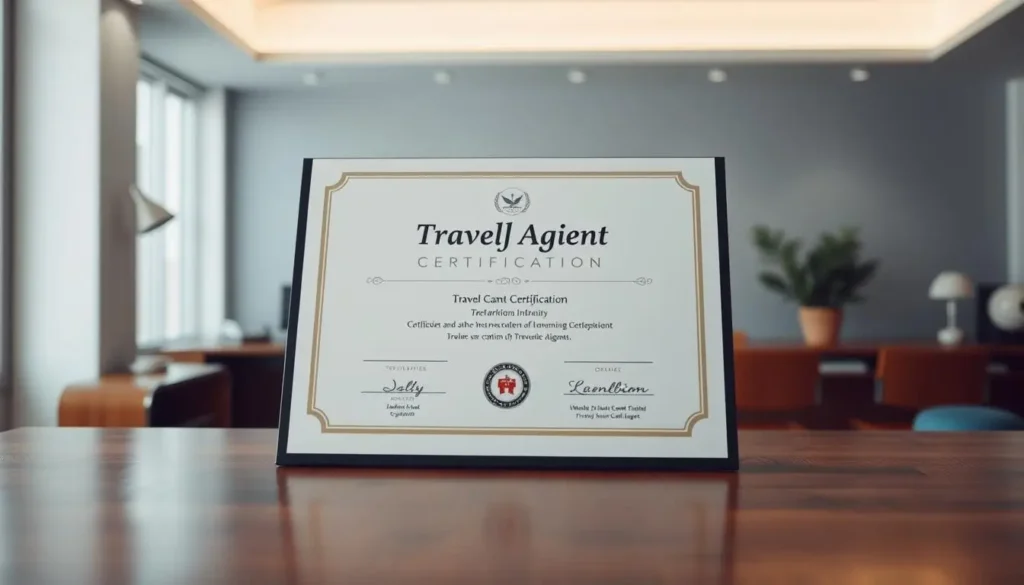How To Get A Travel Agent License
Are you passionate about exploring new destinations and helping others plan their dream trips? Getting a travel agent license is a big step towards making your passion a career. In the United States, the rules for getting licensed vary, but knowing the process is crucial for your success.

Starting this journey means you’ll gain credibility and open doors to new chances in the travel world. This guide will show you the steps and what you need to do. It will make sure you’re ready to begin your career.
Key Takeaways
- Understanding the importance of a travel agent license
- Summary of the licensing procedure in the United States
- Steps to become a licensed travel agent
- Advantages of securing a travel agent license
- Career opportunities with a travel agent license
Understanding Travel Agent Licensing in the United States
Travel agent licensing in the United States is complex. It’s governed by both state and national rules. Knowing these rules is key to your success as a travel agent.
Table of Contents
What is a Travel Agent License?
A travel agent license lets you sell travel services. This license is crucial for a real travel business. Each state has its own rules for getting one.
State-Specific Requirements vs. National Standards
Some rules for travel agent licensing are national. However, every state also has its own regulations. For example, some states need a Seller of Travel registration, while others require a surety bond. Knowing these differences is important for following the rules.
The Difference Between Licenses and Certifications
It’s important to know the difference between a license and a certification. A license is needed to run a travel agency in some states. Certifications, like those from The Travel Institute, show you’re skilled and dedicated to the field.
By understanding these points, you can make sure you’re on the right track. This will help you become a licensed travel agent and do well in your career.
Prerequisites for Becoming a Licensed Travel Agent
Before you begin your journey to become a licensed travel agent, it’s key to know the prerequisites. These steps are the foundation for a successful career in the travel industry.
Educational Background and Requirements
You don’t need a specific degree to become a travel agent. But, a background in hospitality, tourism, or business can help. Some states require training or a certification in travel agency management.
Experience Qualifications
While experience in the travel industry is not always needed, it’s very helpful. Many travel agents start by working for established agencies or tour operators. This helps them gain insights and build a client base.

Business Structure Considerations
Choosing the right business structure is crucial. You can be a sole proprietorship, LLC (Limited Liability Company), or join a host agency.
Sole Proprietorship vs. LLC
A sole proprietorship is straightforward but doesn’t provide personal liability protection. An LLC provides liability protection and tax benefits. Your choice depends on your business needs and how much risk you’re willing to take.
Host Agency Affiliation Option
Joining a host agency can give you support, resources, and industry connections. It’s a good option for starting your agency without the hassle of setting everything up yourself.
| Business Structure | Liability Protection | Complexity |
| Sole Proprietorship | No | Low |
| LLC | Yes | Moderate |
| Host Agency Affiliation | Varies | Low to Moderate |
As noted by travel industry expert,
“The right business structure can make or break your travel agency. It’s crucial to choose wisely based on your business goals and risk tolerance.”
How to Get a Travel Agent License: Step-by-Step Process
Starting your journey to become a licensed travel agent requires several key steps. First, you need to research your state’s regulations. It’s important to know the specific requirements for your state, as they can differ a lot.
Exploring Your State’s Specific Requirements
Start by visiting your state’s official government or travel industry website. Look for information on travel agent licensing. Some states need a Seller of Travel registration, while others have more complex rules.
Make sure to note down the specific requirements, including any necessary forms, fees, and education or training programs.
Finishing Necessary Education and Training Courses
Many states require aspiring travel agents to complete specific education or training programs. These programs teach about travel industry practices, geography, and customer service skills.
Choose programs accredited by recognized travel industry associations for relevant and quality training.
Registering Your Business Entity
To work as a travel agent, you’ll need to register your business entity with the state. This means picking a business name, registering with the Secretary of State, and getting any local business licenses.

Submitting an Application for Travel Seller Registration.
Some states require travel agents to register as Sellers of Travel. This involves submitting an application, paying a fee, and sometimes getting a surety bond.
Documentation Needed
The documents needed for Seller of Travel registration include business registration documents, proof of insurance, and a surety bond.
Application Submission Process
The application process for Seller of Travel registration varies by state. It’s usually filed online or by mail. Ensure you closely follow the instructions and submit all required documents..
Getting a Travel Agency Bond
A travel agency bond is a surety bond that protects consumers if your agency fails to deliver services as promised. The cost and requirements for the bond differ by state.
By following these steps and staying informed about your state’s specific requirements, you can successfully get your travel agent license. Then, you can start your career in the travel industry.
Essential Certifications and Accreditations
Certifications and accreditations are key to boosting your credibility and skills as a travel agent. They show your dedication to the field and give you the tools to stand out in a competitive market.
The Travel Institute Certifications (CTA, CTC, CTIE)
The Travel Institute offers top-notch certifications like the Certified Travel Associate (CTA), Certified Travel Counselor (CTC), and Certified Travel Industry Executive (CTIE). These certifications prove your expertise and open up more career opportunities.
- CTA: Shows you know the travel industry well, including geography and professional practices.
- CTC: Indicates advanced skills in marketing, sales, and customer service.
- CTIE: Focuses on business and management, great for leaders.
IATA/ARC Accreditation Process
Getting accredited by IATA and ARC is a big deal. It shows you meet global standards. IATA’s programs, like the IATA Certified Travel Agent (CTA), are recognized worldwide.
Consortium and Association Memberships
Being part of groups like the American Society of Travel Agents (ASTA) has many perks. You get to network, access resources, and grow professionally.
Benefits of ASTA Membership
ASTA membership comes with lots of advantages, including:
- Networking with industry pros
- Training and educational resources
- Advocacy and representation
Joining Travel Agency Networks
Travel agency networks offer great benefits too. You get to share knowledge, get marketing help, and negotiate better deals.
| Certification/Accreditation | Description | Benefits |
| CTA (The Travel Institute) | Thorough grasp of the travel sector | Enhanced credibility, career prospects |
| IATA/ARC Accreditation | Globally recognized accreditation for travel agents | Increased credibility, access to industry resources |
| ASTA Membership | Membership in the American Society of Travel Agents | Networking opportunities, training resources, advocacy |
Financial Considerations and Ongoing Requirements
Getting a travel agent license is just the start. You also need to think about ongoing financial needs. As a licensed agent, you’ll face various costs to keep your license and run your business well.

State License and Registration Fees
Fees for getting and keeping a travel agent license change a lot by state. Look up the fees your state needs to plan your budget.
Bond and Insurance Costs
You might also need a travel agency bond and insurance. These costs can change based on your agency’s size and services.
Maintaining Compliance
To follow state rules, you must follow renewal steps and keep up with education needs.
Renewal Procedures
Renewing your license usually means filling out an application and paying a renewal fee before it expires.
Continuing Education Requirements
Many states ask licensed agents to take continuing education courses. This keeps you up-to-date and lets you keep your license.
Knowing these financial and ongoing needs helps you manage your travel agent license. It ensures your agency’s long-term success.
Conclusion: Starting Your Journey as a Licensed Travel Agent
You’ve learned how to get a travel agent license. This guide has given you the tools to start your career. To become a licensed travel agent, you need to know the licensing rules, get the right certifications, and follow state laws.
Starting your journey means more than just meeting legal needs. It’s about building a respected and reliable business in the travel world. With proper education, training, and certifications, you can succeed and help your clients.
By following this guide, you’re ready to become a licensed travel agent. Now, take the next step towards a fulfilling career in travel. Learning how to get a travel agent license is your first step to success.
FAQ
What are the basic requirements to become a licensed travel agent?
To become a licensed travel agent, you need to meet certain educational requirements. Having experience that matters is crucial. Your state’s licensing regulations may require you to register your business and get a travel agency bond.
How do I research my state’s specific travel agent licensing requirements?
You can find your state’s specific requirements by visiting your state’s official website. You can also contact your state’s travel agency regulatory body. Or, you can talk to a professional organization like The Travel Institute or the American Society of Travel Agents (ASTA).
What is the difference between a travel agent license and a certification?
A travel agent license is a state-issued permit. It lets you work as a travel agent. A certification shows your expertise and knowledge in the field. For example, The Travel Institute offers the Certified Travel Associate (CTA) and Certified Travel Counselor (CTC) certifications.
Do I need to obtain a travel agency bond as part of the licensing process?
Yes, many states require travel agents to get a travel agency bond. This is to follow state regulations and protect consumers.
What are the benefits of joining professional associations like ASTA or travel agency networks?
Joining associations like ASTA or travel agency networks offers many benefits. You get networking opportunities, access to resources, training, and education. It also boosts your credibility and reputation in the industry.
How often do I need to renew my travel agent license, and what are the continuing education requirements?
The renewal frequency and continuing education for travel agent licenses vary by state. It’s important to check with your state’s regulatory body for specific requirements to keep your license.
Can I operate as a travel agent without a license?
Working as a travel agent without a license can lead to penalties and fines. It can also harm your professional reputation. It’s crucial to follow your state’s licensing regulations for a successful business.
What are the costs associated with obtaining and maintaining a travel agent license?
The costs for a travel agent license include fees, bond and insurance costs, and continuing education expenses. These expenses differ based on the state and personal situations.







